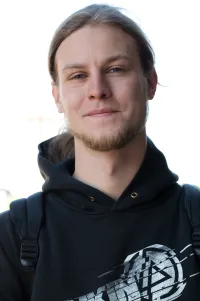
Jule Rönitz is five semester student of Civil Engineering. She is pursuing the Bachelor of Science degree, 1-subject programme.
What made you choose this degree programme?
When I was 14, my family redeveloped an old house from scratch. My siblings and I spent every weekend at the construction site to help. To me, the drafting and realisation of the plans during the construction phase was a fascinating process. I was always good in maths, and after I got my A-levels, I wavered between mechanical engineering and constructional engineering (in hindsight, they are not as closely linked as one would think). Eventually, I opted for construction, after a not very interesting internship in the field of installation engineering.
In which respect have or haven’t your expectations been fulfilled?
When I took up my degree course, I was aware that a lot of mathematics and mechanics lay ahead of me; but I still wasn’t prepared for the pace at which the lectures progressed. All I was prepared for was statics, mechanics and the whole constructive field. Since I had not checked the actual curriculum before I’d started the course, I was very surprised that it included topics such as traffic engineering and fluid mechanics, starting in the third semester.
Generally speaking, studying at university differs greatly from studying at school. But I think this is an experience shared by everyone who takes up a degree course at university.
Which aspect of your degree programme do you enjoy most?
I like static calculations and “looking inside” a building, i.e. load distribution, the way the system as a whole handles it, and in what way the middle of a bridge differs from its beginning and end when a car drives over it. The thing I enjoy most is that it’s possible to apply everything I learn in my classes to the world around me. It doesn’t matter if the way a building has been constructed catches my eye or if I’m trying to decode the wiring diagram while waiting at the traffic lights. The lecture I attended in the morning is directly applicable to my surroundings. In my opinion, this makes mechanical engineering one of the most application-oriented degree courses.
What has been your biggest challenge to date?
The main challenge is to keep myself motivated and organised. The workload is very heavy from the very start. It takes a lot of discipline to recalculate the problems from the exercises and to show up at lectures, because nobody checks up on you. During the winter semester especially it’s much more appealing to close your eyes again, rather than sitting in the lecture hall at 08:15. You’ll regret it once the exam phase starts, though.
What would you like to become after completing your degree?
I spent the time between my A-levels and university doing an internship at a testing engineer’s office with the key competence bridge construction. I liked that a lot, and I also enjoy statics as a theoretical subject. Therefore, this is the field that I will pursue.
Which advice would you like to give to students who consider enrolling in this degree programme?
Prepare for being quite overwhelmed to begin with, especially with mathematics and mechanics. Don’t be afraid of taking advantage of your teachers’ office hours and asking questions during lectures and exercises. Moreover, it helps to study together with others. The frustration levels don’t spiral out of control, you’ll be able to help each other, and you’ll be more motivated to spend time with your books if you know that your study group is going to discuss the mechanics exercises the next day. Fending for yourself is definitely more difficult. Plus: it means you always have someone to go out with in Bermuda3eck on Friday night.



